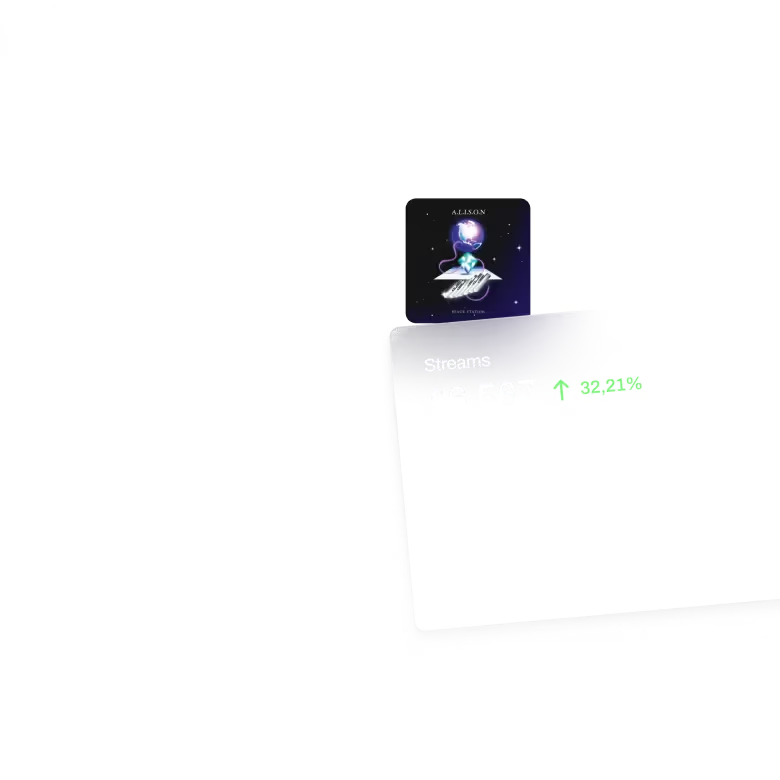
How To Switch Music Distributor - without losing streams

More often than not, you don’t end up spending the rest of your life with your first crush.
Those things that attracted you to them in the first place get a bit less shiny over time. The quirks you used to find weirdly adorable are now just weird and you start thinking that the grass might actually be greener elsewhere.
If you’re looking at your music distributor and feeling those same uncertainties, that’s okay. Your needs evolve over your music career, and it’s normal to feel as though you’ve outgrown your original choice.
But if you’ve decided to level up and choose a distributor that’ll help you reach the next level in your music career (spoiler alert: that’s us!), how can you make the break-up with your current distributor as pain-free as possible?
Keep reading, because we’re about to explain exactly how to switch music distributors without losing streams (or your mind) in the process.
Why it might be time to switch music distributors
Your distributor is just distributing your music
Yes, a distributor distributes. But if you’re serious about growing your music career, but don’t want to sign with a major label and lose control of your music, you need a distributor that does more than just distribute.
DIY distributors, like DistroKid and CD Baby, are a good choice early on in your career. There are no entry requirements and you can distribute your music to all the usual music platforms. They’re a good way to start releasing your music and building an audience.
But DIY distributors don’t help you get to the next stage of your music career. They don’t support you with things like playlist pitching, digital rights management, or social media promotion (or, if they do, they charge you extra on top of your per-release fees).
If you’re desperate to land an editorial playlist placement or want to make sure your music is actually earning everything it should be earning, you need more than a DIY distributor. It’s time to make the switch.
You’re being ghosted & left on read whenever you have a problem
Maybe you’ve always struggled to get the attention you deserve from your distributor, or maybe they’re newly disappointing - either way, if you’re being left on read when you’ve got a distribution problem, it’s time to move on.
The nature of DIY distributors is that they’re exactly that - Do It Yourself. When you need support, it can be difficult (or impossible) to get it. If you’re just starting out in your music career, that might be okay. You can figure out the basics to get your music out there.
But as your music career grows, you need more from your distributor. If you’re finding your questions go unanswered or you’re being fobbed off by the dreaded AI chatbots, it’s time to find a better distributor who gives you the support you need, whenever you need it.
How to switch music distributors
If you’ve made the decision to move your music to a new distributor and have found one that suits your needs, the next step is to move your catalogue over - so that all your releases are in one place and managed by one distributor.
Depending on your choice of music distributor, the process may look slightly different than what we’ll outline here - but the overall stages will remain the same no matter where you’re transferring your music from or to!
Step One: gather your metadata
Your new distributor may have a preferred format to receive your metadata in, but they will generally want all of the metadata attributes for each release you’re transferring over.
This includes:
- Track and release title
- Artwork
- Main Primary Artist, Primary Artist, Featured Artist, etc.
- Primary and Secondary Genre
- Label (if applicable)
- UPC (very important!)
- ISRC (also very important)
And any other metadata relevant to your releases. If you’ve got track splits with other artists, your new distributor will need details of those too to ensure everyone gets paid correctly.
If you’re moving your catalogue to Identity Music, we can provide you with a template spreadsheet to gather all your metadata ready for ingestion.
Step Two: gather your audio files
The best way to keep your music quality as good as it can be is to provide your new distributor with original audio files for each of your releases. Whether that’s done via a Google Drive folder, Dropbox, or some other file-sharing platform, the important thing is that you’re sending your new distributor files in a compatible format at the highest quality possible.
If you’re moving to Identity Music, WAV files are best!
Step Three: upload your releases
Your new distributor may have a method of uploading your migrating releases in bulk - so check with them before you spend time uploading each release individually! If they do, you’ll likely just need to either upload or provide them with your metadata spreadsheet and audio files and they’ll do the rest.
At Identity Music, if you’re able to send us metadata and audio files we’ll build your releases in bulk, reviewing your metadata for accuracy as we do, so that you don’t need to do anything manually.
Step Four: wait for tracklinking
Once your releases have been uploaded by your new distributor and sent for distribution, it’s time to wait. At this point, it can be tempting to think it’s okay to request takedowns of your releases from your previous distributor - but if you do that before the releases have had a chance to tracklink across platforms, you run the risk of losing your streaming data.
It usually takes around 6 weeks for your releases to fully sync between your previous and new distributor. While this is happening, your music will still be live everywhere and your listeners won’t see anything different from their perspective.
Step Five: request takedowns
Once your new distributor has confirmed it is okay to do so, the final stage of switching distributors is to request takedowns of your releases from your old distributor. This will mean that your earnings and streaming data can be managed by your new distributor from now on.
Even though the usual timeframe is 6 weeks for tracklinking, make sure you check with your new distributor before you request takedowns so that your streaming data is safe.
Frequently Asked Questions: switching distributors
Will I lose my streams if I switch distributors?
No! Not if you switch distributors carefully. Maintaining your streams and data across platforms like Spotify relies on providing accurate and complete metadata to your new distributor, so that the streaming platforms know that you’re re-releasing the same assets, not new ones. Using the same ISRC and UPC codes across your previous distributor and new distributor is the key to keeping your streaming data intact while you switch music distributor.
Will my music be unavailable while I switch distributors?
Again, not if you switch distributors carefully! To ensure no downtime for your music (and so your fans can continue listening to your music seamlessly and be none the wiser about your distributor switch), your releases need to stay live with your previous distributor until your new distributor gives you the green light to request takedowns.
The track linking process usually takes around 6 weeks and during that time there will technically be two versions of your releases live, but your fans will see just one version - the behind-the-scenes technology is syncing up the releases so that your stats are transferred over to your new distributor, but nothing will change as far as your fans are concerned!
I don’t have the original metadata for my releases - can I still switch distributors?
In most cases, yes! We can source the metadata from your live releases ready for uploading into your new distributor’s dashboard. In an ideal world, your new distributor would need your metadata and audio files (WAV) - but if you can’t gather your metadata, there are ways to solve that.
Will switching distributors help me get more streams?
Not directly. Moving your releases from one distributor to another won’t automatically make any difference to your streaming performance. BUT, depending on which distributor you’re switching to, having a higher level of support, guidance and expertise in your corner will have a positive impact on the trajectory of your music career.
At Identity Music, for example, we don’t just distribute your music. We also pitch it to editorial playlists, promote it on our social channels, provide you with marketing advice and support, and give you technical assistance when you need it. Having a partner rather than just a distributor can definitely help to boost your streaming performance.




.png)

